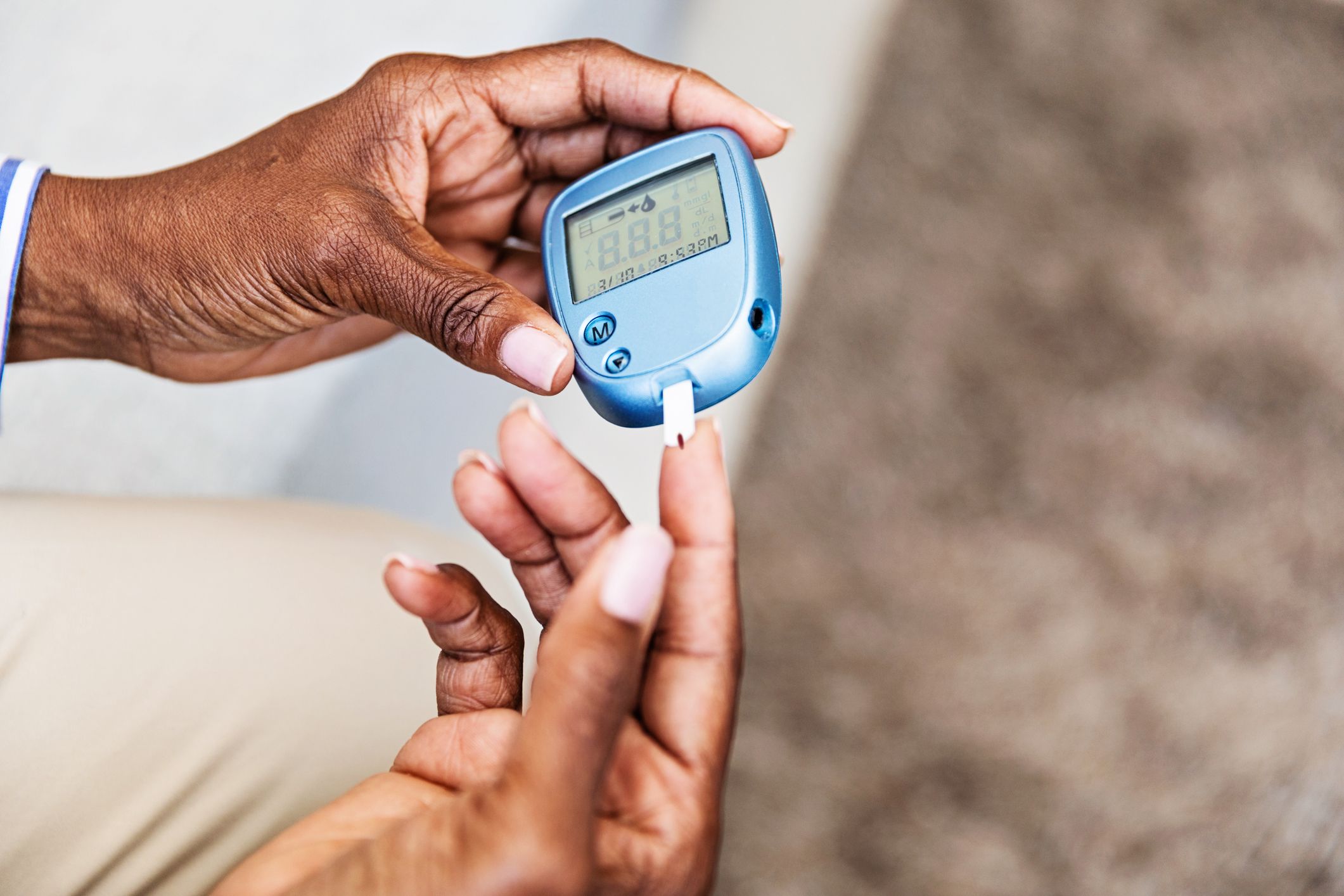5 ways to protect your heart when you have diabetes
Keep your heart healthy with these diabetes-friendly lifestyle changes.
Updated on August 17, 2022

If you’ve been diagnosed with diabetes, it’s vital to take steps to protect your heart health. In fact, people with type 1 or type 2 diabetes have such a greater risk of heart disease, there’s a name for it: diabetic heart disease (DHD), also known as diabetic cardiomyopathy.
For example, women with type 1 or type 2 diabetes are up to five times more likely to have… Show More
If you’ve been diagnosed with diabetes, it’s vital to take steps to protect your heart health. In fact, people with type 1 or type 2 diabetes have such a greater risk of heart disease, there’s a name for it: diabetic heart disease (DHD), also known as diabetic cardiomyopathy.
For example, women with type 1 or type 2 diabetes are up to five times more likely to have heart failure, according to a 2020 article published in Circulation Research, while men are more than twice as likely. People with diabetes are also more likely to develop heart issues at a younger age and more likely to die from a cardiovascular-related event, like a heart attack or stroke.
To protect your heart when you have diabetes, it is important to monitor your blood sugar levels, adhere to your prescriptions or other medical treatments, and maintain a healthy weight. Weight management is particularly important if you have extra pounds around your stomach—a known risk factor for heart disease.
Fortunately, certain lifestyle changes can help lower your blood sugar levels, your risk of developing DHD, and your chances of associated issues, such as heart attack and stroke. Not sure where to begin? These lifestyle tips are a good place to start.
Show Less
Eat a well-balanced diet
A balanced diet is important for your overall health, but is crucial for people with diabetes and diabetic heart disease. The food you eat can help you maintain healthy blood sugar levels, manage your weight, and provide your body with the heart-healthy nutrients it needs.
In addition to eating… Show More
A balanced diet is important for your overall health, but is crucial for people with diabetes and diabetic heart disease. The food you eat can help you maintain healthy blood sugar levels, manage your weight, and provide your body with the heart-healthy nutrients it needs.
In addition to eating lots of veggies and your favorite low-sugar fruits, reduce your intake of trans and saturated fats from red meat, fried, and processed foods. Swap those for healthy polyunsaturated and monounsaturated fats from nuts, omega-3 rich olive oil, and fatty fish like tuna, salmon, and sardines.
Amp up your fiber intake to 22 to 34 grams per day, as well, from minimally processed sources like beans, whole grains, non-starchy vegetables, and nuts. Fiber helps you feel fuller longer and lowers LDL cholesterol, while whole grains digest slower, reducing the risk of a blood sugar spike.
Popular diets like the Mediterranean, DASH, and flexitarian diets promote heart health, but won’t leave you feeling deprived at mealtime. You can also try the diabetes plate method, in which you fill half your plate with non-starchy vegetables, one-quarter with lean protein, and the last quarter with carbs.
Show Less
Maintain a healthy weight
Excess weight is the major risk factor for the development of type 2 diabetes, as well as comorbidities like high blood pressure, stroke, and heart attack. What’s more, excess weight can cause insulin resistance; those who are overweight or obese aren’t able to use insulin as effectively or… Show More
Excess weight is the major risk factor for the development of type 2 diabetes, as well as comorbidities like high blood pressure, stroke, and heart attack. What’s more, excess weight can cause insulin resistance; those who are overweight or obese aren’t able to use insulin as effectively or efficiently.
Developing a weight loss regimen can be tough but maintaining a well-balanced diet and exercise schedule are a must for heart health. Talk to your healthcare provider (HCP) or a nutritionist about the right program for you.
The good news is, losing just small amounts of weight—even 10 to 15 pounds—can reduce your risk of heart disease and improve glucose levels. You can boost your weight loss by:
- Keeping a food and activity diary. One study showed that those who kept detailed food diaries doubled their weight loss.
- Prepping meals. After a long day of work and chores, cooking a healthy meal is likely the last thing on your mind. Make healthy eating easy by preparing a week’s worth of meals at a time. That way, all you have to do is heat them up and enjoy.
- Partnering up. If you worry you won’t be able to hold yourself accountable, find a diet or workout buddy who will.

Move every day
Getting daily activity—even if it’s just a walk around the neighborhood—is key to heart health, especially for people living with diabetes. Experts recommend adults get in at least 150 minutes of moderate-intensity or 75 minutes of vigorous-intensity aerobic activity (or a combination of the two)… Show More
Getting daily activity—even if it’s just a walk around the neighborhood—is key to heart health, especially for people living with diabetes. Experts recommend adults get in at least 150 minutes of moderate-intensity or 75 minutes of vigorous-intensity aerobic activity (or a combination of the two) per week, along with two sessions of muscle strengthening. This regimen can help control weight, decrease risk of heart disease, and strengthen the heart, lungs, and muscles.
Movement is also important for keeping blood sugar balanced. Inactivity makes muscle cells more resistant to insulin, which may contribute to higher blood sugar levels.
You don’t have to go for a run or do a high-intensity workout to reap the benefits of exercise. Choose an activity you love to do, then sneak extra steps into your day by taking the stairs instead of the elevator, taking a post-dinner walk, or marching in place while you watch your favorite TV show. An HCP can also recommend activities that fit with your age, lifestyle, health, and physical ability; speak to them before starting any new exercise program.
Show Less
Kick the tobacco habit
Smoking is considered to be a cause of diabetes. People who smoke have up to a 40 percent higher risk of developing the condition, according to a 2014 United States Surgeon General’s report. And the more you smoke, the higher your risk.
When you have diabetes, smoking makes managing the… Show More
Smoking is considered to be a cause of diabetes. People who smoke have up to a 40 percent higher risk of developing the condition, according to a 2014 United States Surgeon General’s report. And the more you smoke, the higher your risk.
When you have diabetes, smoking makes managing the disease harder. Smokers with diabetes also have a higher risk of developing:
- Heart disease, stroke, and kidney disease
- Poor circulation in the legs that can lead to infections, ulcers, or even amputations
- Nerve damage
- Blindness caused by retinopathy
Quitting smoking can be hard—and it may take several attempts before you can finally kick the habit. Fortunately, there are tons of smoking cessation tools, including nicotine patches and gum, prescription medications, support groups, free quit lines, and even handy smartphone apps.
It’s important to remember that ditching tobacco can lead to weight gain, a risk factor for diabetes. Ask an HCP about strategies for managing extra pounds.
Show Less
Know your numbers
In addition to monitoring your blood sugar levels, if you have diabetes, you should be regularly testing your blood pressure and cholesterol, too. Being aware of your numbers—whether they’re good or bad—can help you take the steps necessary to improve your heart health.
If you have high blood… Show More
In addition to monitoring your blood sugar levels, if you have diabetes, you should be regularly testing your blood pressure and cholesterol, too. Being aware of your numbers—whether they’re good or bad—can help you take the steps necessary to improve your heart health.
If you have high blood pressure and high cholesterol, adopting heart-healthy habits like maintaining a balanced diet, reducing sodium and saturated fat intake, exercising daily, managing stress, and getting enough sleep can help bring your numbers to a healthier level.
Show Less
Ritchie R & Abel D. Basic Mechanisms of Diabetic Heart Disease. Circulation Research. May 21, 2020. 126; 1501-1525.
Centers for Disease Control and Prevention. Diabetes and Your Heart. Page last updated June 20, 2022.
American Heart Association. Too much belly fat, even for people with a healthy BMI, raises heart risk. Page last updated April 22, 2021.
American Diabetes Association. Fats. Page accessed on August 2, 2022.
Centers for Disease Control and Prevention. Fiber: The Carb That Helps You Manage Diabetes. Page last updated June 20, 2022.
American Diabetes Association. Extra Weight, Extra Risk. Page accessed August 2, 2022.
Cleveland Clinic. Diabesity: How Obesity Is Related to Diabetes. November 8, 2021.
Centers for Disease Control and Prevention. How much physical activity do adults need? Page last reviewed June 2, 2022.
Lakehi S, et al. Short-term physical inactivity induces diacylglycerol accumulation and insulin resistance in muscle via lipin1 activation. Endocrinology and Metabolism. December 3, 2021. 321.
Centers for Disease Control and Prevention. Smoking and Diabetes. Page last updated May 5, 2022.
Mayo Clinic. Diabetes care: 10 ways to avoid complications. Page last updated January 29, 2022.
USDA. Dietary Guidelines for Americans: 2020-2025. December 2020.
Harvard TH Chan School of Public Health. Whole Grains. Accessed August 17, 2022.
Hollis JF, Gullion CM, et al. Weight Loss Maintenance Trial Research Group. Weight loss during the intensive intervention phase of the weight-loss maintenance trial. Am J Prev Med. 2008 Aug;35(2):118-26.
U.S. Department of Health and Human Services. The Health Consequences of Smoking—50 Years of Progress: A Report of the Surgeon General. Atlanta: U.S. Department of Health and Human Services, Centers for Disease Control and Prevention, National Center for Chronic Disease Prevention and Health Promotion, Office on Smoking and Health, 2014.
Featured Content

article

article

article

article
